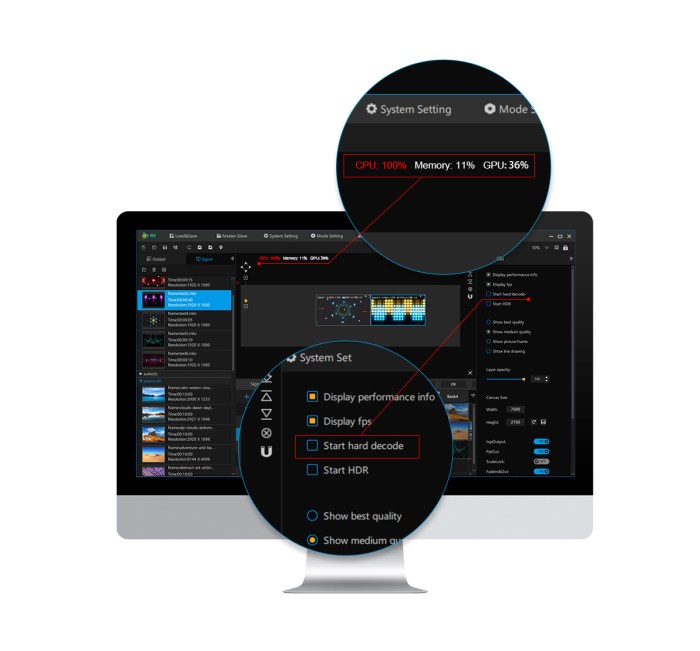What is hardware decoding – Embarking on a journey into the realm of hardware decoding, we uncover the intricacies of a technology that has revolutionized the way we consume multimedia content. Hardware decoding stands as a cornerstone of modern computing, empowering devices with the ability to decode and process video and audio data with unparalleled efficiency and speed.
At its core, hardware decoding harnesses the power of dedicated hardware components, such as graphics processing units (GPUs) or specialized decoder chips, to offload the demanding task of media decoding from the central processing unit (CPU). This division of labor allows the CPU to focus on other essential tasks, resulting in a smoother, more responsive user experience.
Hardware Decoding Overview
Hardware decoding is a process that uses specialized hardware components to decode video and audio data. It offers significant performance advantages over software decoding, which relies on the CPU to handle the decoding process. Hardware decoding is commonly used in devices such as TVs, smartphones, and laptops to enhance the user experience for multimedia content.
The benefits of using hardware decoding include:
- Improved performance and reduced latency
- Reduced power consumption
- Enhanced image and audio quality
However, hardware decoding also has some limitations:
- It requires specialized hardware, which can be expensive
- It may not be compatible with all video and audio formats
Examples of devices that utilize hardware decoding include:
- Smart TVs
- Blu-ray players
- Gaming consoles
Hardware Decoding Process

The hardware decoding process involves the following steps:
- The video or audio data is received by the decoder chip.
- The decoder chip decodes the data using specialized hardware.
- The decoded data is then sent to the display or audio output.
The decoder chip is a key component in the hardware decoding process. It contains specialized circuitry that is designed to efficiently decode video and audio data. There are different types of hardware decoding technologies, including:
- MPEG-2
- H.264
- HEVC
Hardware Decoding Applications

Hardware decoding is commonly used in the following applications:
- Video playback
- Audio playback
- Gaming
Hardware decoding enhances the user experience in these applications by providing smooth and high-quality playback. For example, in video playback, hardware decoding can reduce buffering and improve the overall viewing experience.
Specific examples of applications that benefit from hardware decoding include:
- Streaming video services (e.g., Netflix, YouTube)
- Blu-ray players
- Gaming consoles
Hardware Decoding Comparison
Hardware decoding offers several advantages over software decoding:
- Improved performance
- Reduced power consumption
- Enhanced image and audio quality
However, software decoding is more flexible and can be used on a wider range of devices.
The following table summarizes the key differences between hardware and software decoding:
| Feature | Hardware Decoding | Software Decoding |
|---|---|---|
| Performance | Better | Worse |
| Power consumption | Lower | Higher |
| Image and audio quality | Better | Worse |
| Flexibility | Less | More |
| Cost | Higher | Lower |
Future of Hardware Decoding, What is hardware decoding

The future of hardware decoding looks promising. With the increasing demand for high-quality video and audio content, hardware decoding is expected to become even more prevalent in devices such as TVs, smartphones, and laptops.
Current trends and advancements in hardware decoding technology include:
- The development of new and more efficient hardware decoding algorithms
- The integration of hardware decoding into more devices
- The development of new applications that take advantage of hardware decoding
These advancements are expected to further enhance the user experience for multimedia content and make hardware decoding an essential technology for the future.
Essential Questionnaire: What Is Hardware Decoding
What is the primary advantage of hardware decoding?
Hardware decoding offers significantly faster and more efficient media decoding compared to software decoding, resulting in smoother playback and reduced latency.
What types of devices commonly utilize hardware decoding?
Smartphones, laptops, televisions, and gaming consoles are among the many devices that leverage hardware decoding capabilities.
How does hardware decoding enhance the user experience?
Hardware decoding enables seamless video playback, eliminates buffering delays, and improves overall system responsiveness, providing a more immersive and enjoyable user experience.
